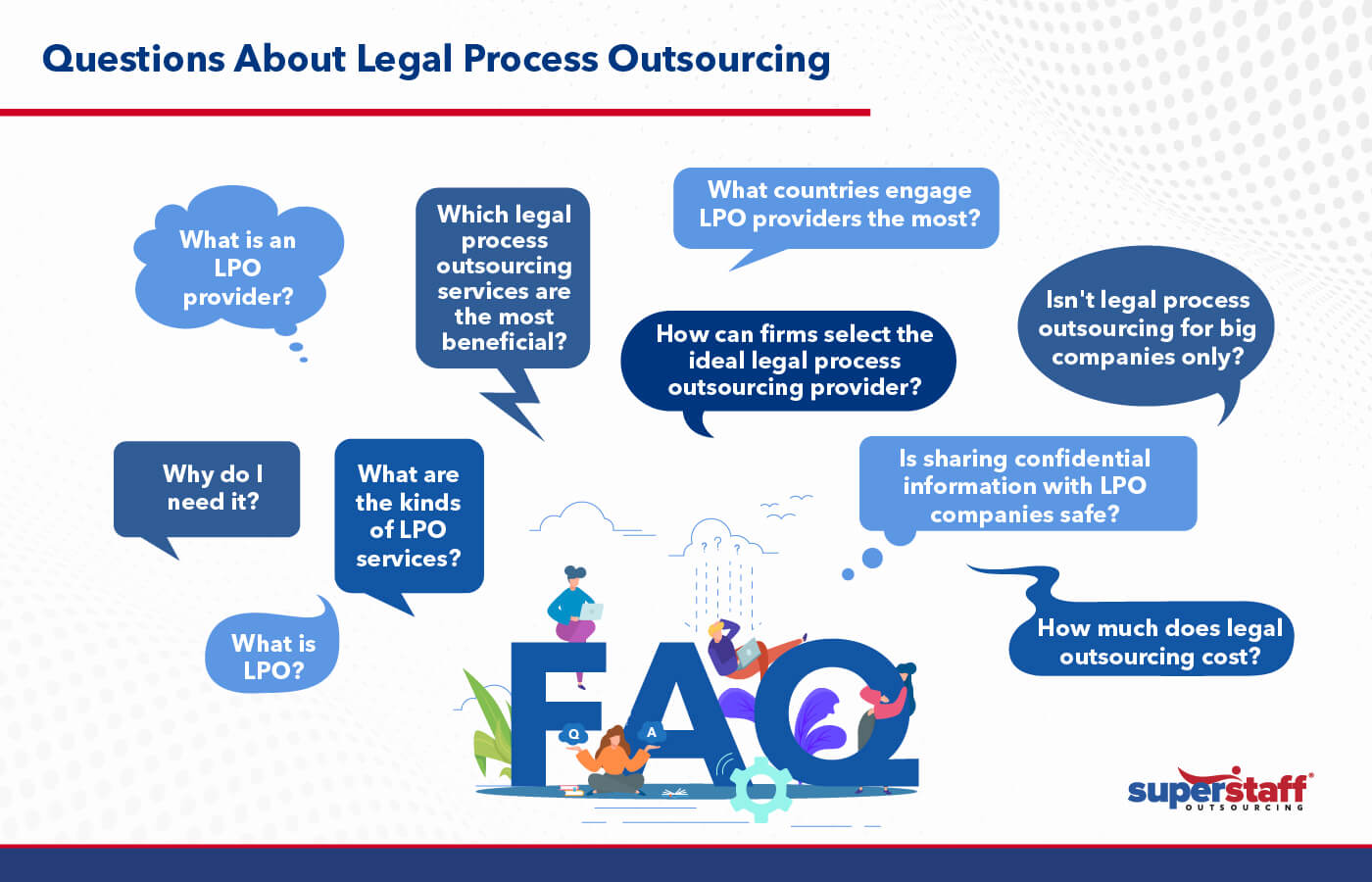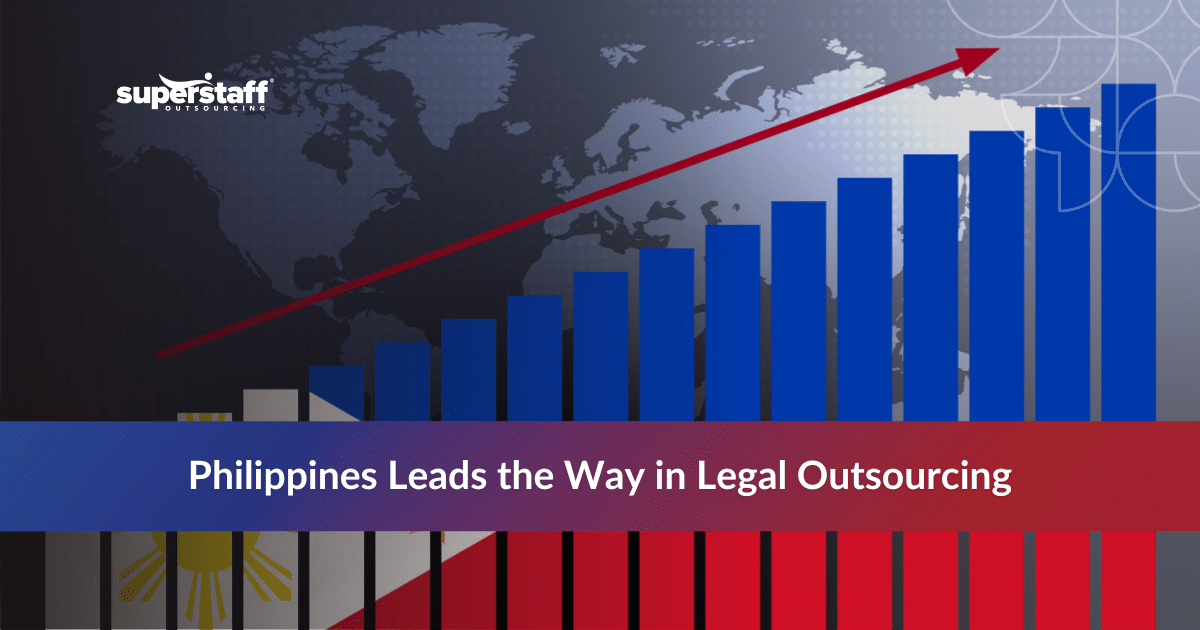
When the COVID-19 pandemic and subsequent “The Great Resignation” movement came about, the legal industry was one of the sectors most affected by labor shortages amid increasing demand. After all, there are only so many hours a day, and even the most successful law firm can find itself swamped with overwhelming work.
What can law firms and corporate legal departments do to address staffing shortages and minimize the burden on their existing workforce? The answer is simple: legal process outsourcing.
If you’re curious about what LPO is and how it works, this article will guide you through everything you need to know about outsourcing legal work. Later, we’ll also cover how you can find and work with your ideal LPO provider.
14 Questions (and Answers) About Legal Process Outsourcing

1. What is LPO?
Legal process outsourcing is when a traditional law firm transfers a portion of its routine workloads to specialized third-party.
On average, lawyers work about 50 hours per week, juggling various responsibilities, including attending court hearings, preparing documents, performing legal research, and much more. Legal outsourcing companies reduce the burden placed on lawyers’ shoulders by handling essential non-core tasks, such as answering calls or scheduling client visits, so they can focus on what they do best.
2. Why do you need legal process outsourcing services?
Many law firms and departments are pulled in a thousand different directions, especially during busy seasons. Lawyers and their legal staff can hand off routine tasks to capable outsourcing providers through legal outsourcing services and devote their valuable time, attention, and resources to their urgent and essential cases.
Another significant advantage of legal outsourcing is that it is more cost-effective than hiring and training an in-house team.
The demand for legal services fluctuates wildly, and legal outsourcing companies allow firms to expand or downsize their operations depending on the caseloads for the season.
3. What are legal outsourcing companies doing?
Lowering the Cost of Legal Operations
You can focus more funds on other important aspects of your business by eliminating overhead costs on things such as office space, equipment, and software.
Expanding Your Expertise
Since there are so many subspecialties within the legal industry, it would be impossible for your firm to become proficient in all of them.
You can provide other legal services beyond your scope without retaining an attorney full-time.
Allowing More Flexibility for Your In-House Team
The pressure on law firms and departments to consistently turn a profit is more significant than ever.
To ease the pressure on your in-house team, LPO providers can step in when you need extra support but want to avoid paying for full-time employees.
Read More: Find Out the Top 7 Sectors Suffering Labor Shortage Due to ‘The Great Resignation’
4. What kind of legal services are most amenable to outsourcing?
LPO companies can take on a wide array of job functions, depending on the needs of legal services companies.
The most commonly outsourced legal support services include:
Administrative Support
- Scheduling
- Paralegal Services
- Legal Virtual Assistant Services
Litigation Support
- Litigation Document Review
- E-Discovery Services
Legal Research and Analysis
- Case Law Research
- Legal Coding and Indexing
Finance
- Accounting
- Billing Solutions
Information Management
- Record Keeping
- Database Management
- Data Entry
- Document Management
Legal Writing
- Notices
- Opposing Papers (Motions, Cross-Motions, and Objections)
Contract Management
- Contract Abstraction
- Contract Review
Other Services
- Judgment Review and Summary
- Analysis of Decided Cases
- Legal Data Processing
5. What is the difference between legal process outsourcing and offshoring?
Offshoring refers to outsourcing, where companies utilize overseas labor to complete non-core job functions. Meanwhile, legal process outsourcing can be accomplished by capable LPO providers no matter where they reside, be it onshore, nearshore, or offshore.
6. Which legal process outsourcing services are the most beneficial to a law firm?
The legal process outsourcing service that will be most beneficial for a law firm will depend on the client and the organization’s particular needs and circumstances.
For example, imagine a law firm dealing with a new client involved in a time-sensitive multi-million dollar lawsuit.
The most practical solution, in this case, would be to hire LPO providers that can take on legal work such as document review and research, allowing you to meet your client’s immediate needs without hiring new staff members after the case concludes.
Some legal service providers may need help to stay afloat during tax season because of the influx of new clients needing assistance with tax filing and compliance.
In this case, paralegal outsourcing can be valuable to your firm, allowing you to expand your legal operations during busy seasons while reducing the workload of your existing lawyers.
7. What countries engage LPO providers the most?
All parts of the globe benefit from legal outsourcing services, but the U.S., the U.K., New Zealand, Singapore, and Australia are the countries that utilize this outsourcing solution the most.
8. What countries are known for providing LPO?
The Philippines is one of the countries most renowned for providing offshore legal outsourcing services because of its large pool of highly skilled legal talent, including educated professionals specializing in legal functions.
Other countries in the Asia-Pacific region, such as India, China, and Malaysia, also offer offshore legal work for U.S. businesses.
9. What is the size of the global Legal Process Outsourcing Market?
To illustrate just how critical outsourcing has been to the legal industry, consider how many firms and corporations worldwide are utilizing it. In 2021, industry analysts valued the worldwide legal process outsourcing market at $10.77 billion, and this number might continue to rise from 2022 to 2030.
10. What is the size of the Asia-Pacific Legal Process Outsourcing Market?
In the Asia-Pacific region, LPO services continue to be booming. In 2020, the region’s LPO Market size was estimated at $4.5 billion, and industry analysts predict it will keep rising at a 24% growth rate until 2027.
Countries like the Philippines, India, China, Malaysia, Indonesia, and Thailand are providing high-quality LPO services at cost-effective rates, leading to significant growth in demand.
11. What are the advantages of legal process outsourcing in the Philippines?
The Philippines is home to several premier universities that produce top-tier law graduates. By choosing the country as your legal process outsourcing destination, you can access this large talent pool of law professionals to help your firm’s various legal functions.
As a former American colony, the Philippines also has close cultural ties with the U.S. The country’s LPO providers are familiar with and trained to handle cases involving U.S. laws. The right Philippine LPO company will also stay updated on any developments in the legal sector, including being familiar with new regulations, technology-driven trends, and other possible disruptions.
12. How can firms select the ideal legal process outsourcing provider?
Before you can start your search for an LPO provider, you must first evaluate your firm’s particular needs. What legal functions take up much of your in-house staff’s time but can be completed by third-party providers? Do you need to outsource administrative tasks like specialized legal coding and indexing?
Once you’ve determined the areas of improvement within your law firm, the next step is to research different legal process outsourcing companies and see if their solutions can meet your specific needs. Ideally, your LPO provider will handle tasks efficiently and consistently and be trustworthy in keeping your sensitive information and cases private and confidential.
13. How can law firms get assurance about the quality of the work provided by LPO companies?
Transparency and communication are vital to providing superior quality, top-notch services.
Law firms must be clear and firm about their expectations from the beginning. For quality assurance, LPO companies provide accurate ways to measure performance and keep lines of communication open so the firm can review the quality of work delivered and offer feedback when needed.
14. Is sharing confidential information with LPO companies safe?
Regarding data security and privacy, a reliable legal process outsourcing company will draft and enforce a non-disclosure agreement (NDA) with its client.
This NDA will ensure the data security of any sensitive or confidential information the firm shares with the LPO provider will not be disclosed or made available to any other parties.
15. Isn’t legal process outsourcing for big companies only?
The truth is that law firms of all sizes can benefit from LPO solutions. Smaller firms can outsource certain functions to quickly expand and scale up their operations for a particular case or project while staying within their budget and financial constraints.
Through LPO, smaller law firms can improve their staffing flexibility and compete with more prominent corporations without breaking the bank.
16. How much does legal outsourcing cost?
There is no standard cost of outsourced legal services. It varies depending on your staffing and job needs.
Typically, pricing is calculated based on their skill level (entry, mid, or expert), the number of employees you need, as well as their tenure of contract. It may also vary depending on whether you’re seeking part-time or full-time employees. Pricing also takes into account the LPO provider’s service charges.
Nevertheless, outsourcing is still far more practical than hiring and maintaining an in-house team when you consider overhead costs and other incidental expenditures.
Cost efficiency is one of the primary reasons most legal services companies outsource. By working with skilled offshore talent, they significantly cut down the cost of their operations.
17. How do you choose the best legal outsourcing services?
Your primary consideration when choosing the right LPO provider should be your specific objectives- to save time, cut costs, or streamline productivity.
While all LPOs providers claim they can provide top-notch service, each has its strengths and weaknesses. Explain your financial situation as clearly as possible. Be straightforward about how much money you can afford to put into the venture.
18. What is the best question to ask a legal outsourcing company before hiring one?
Of course, it’s not advisable to get into a partnership with a company based on just one question, but hypothetically, if you had to choose just one question to ask, you need to find out about their track record.
Since long-term success is one of the top criteria you need to consider, researching their track record is of utmost importance. It’s safe to assume that a firm with plenty of satisfied customers is a reliable provider. You can rest assured that they will handle your projects and clients competently.
19. Can legal process outsourcing be illegal?
The short answer is no.
While there may be some legal considerations, such as the employment laws in the country you are offshoring to, if you abide by these, then you should be fine.
Stay Competitive with Legal Process Outsourcing
Find a reputable BPO that outsources a comprehensive array of legal processes. As a company, the ideal BPO partner is committed to helping law firms hone their core skills while maintaining the highest standards of integrity and confidentiality.






